How To Prepare for Your Vet Visit
As an Amazon Associate, I earn from qualifying purchases. We may receive a commission for purchases made through these links. This site also contains affiliate links to products besides Amazon, like Etsy. We may receive a commission for purchases made through those links too (at no additional cost to you).
Things Your Veterinarian Needs to Know
It can be very stressful when your pet gets sick. In all the hustle and bustle of making an appointment for your vet and worrying about your animal’s health, it can be confusing to know how to prepare for your vet visit. There are certain things your veterinarian needs to know to have the best chance to properly diagnose and treat your pet as soon as possible.

Why You Should Prepare for Your Vet Visit
Veterinarians have an incredibly difficult job. They must be able to diagnose a variety of illnesses and injuries in several different species. To make things even more difficult, their patients can’t speak and tend to hide their symptoms. The same symptom can be caused by multiple things. This means that with limited information, your vet may need to perform several tests to narrow down the core issue.
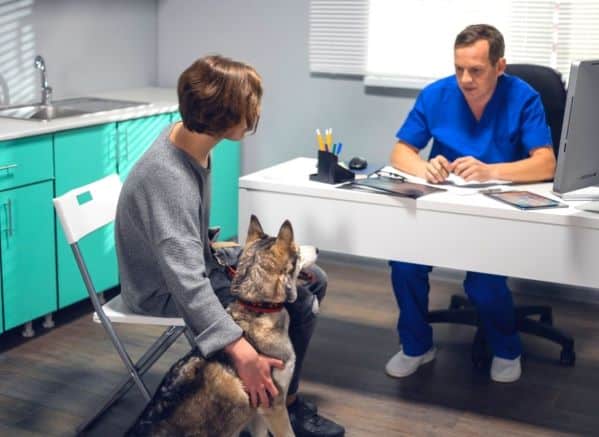
The best thing you can do for your pet is to give your vet as much information as possible so your pet can get the care that they need. This will also help eliminate the need for extra tests to come up with the correct diagnoses and treatment plans. By preparing for the appointment ahead of time, you are less likely to forget to pass on important details.
To make it easier, we created a Vet Visit Quick Report Form. This form will help you easily record the important details that we will cover in this post that will help your veterinarian keep your pet healthy and happy. To get this form and other helpful templates, join our community and subscribe here.
Facts vs Thoughts
One of the most important things you can do to help your veterinarian help your animal is to understand the difference between the facts and your thoughts. It is incredibly easy to let our thoughts color our explanations when we try to communicate what is going on. This can lead to leaving out vital information because you believe that something didn’t matter.
As much as we love our animals, it is important to remember that they are not human. This means that their actions and symptoms may not mean what we think. Therefore, when relaying symptoms and concerns about your animals, it is important to let your vet know the facts first.

A fact would be that your dog started having random potty accidents in the house. A thought would be that your dog is having accidents in the house because they are upset with you when you are busy. Unless you have carefully tracked your activities and your dogs’ accidents and then have proven a correlation between the two, this is not a fact. An animal that has suddenly started having accidents in the house or peeing in bed could in fact have one of several medical issues that can be fixed.
A fact would be that your cat has started several new medications. Another fact is that they have stopped eating. A thought is that your cat has stopped eating because of their medications. This may be true, but a loss of appetite may also be tied to something entirely different.
A fact is something that is undeniably true. A thought is just a guess, belief, or opinion about something. Whereas your thoughts could be true, it is important to remember that until they are verified, they are not facts yet. Your thoughts could delay the proper treatment for your pets.
Problem/Concern
When you arrive at your appointment, clearly state the original problem that caused you to reach out to your vet. Make sure to voice all the concerns that you have regarding your pet. It is perfectly fine to state your opinions, just remember to be clear what the real facts versus your thoughts are. This way, the doctor will clearly be able to understand the information you are giving them and be better able to make a proper diagnosis.
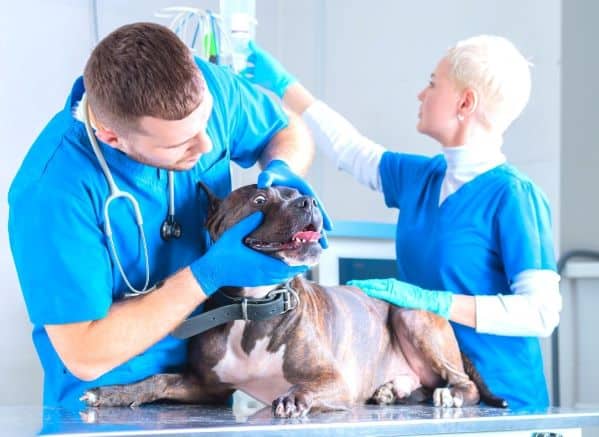
The more information you can give your veterinarian, the better the chance they have of quickly narrowing down what the problem is. Remember that your vet must take the information you give them, do a basic health check on your animal, and then decide what the next step will be.

This decision is dependent on whether they think the problem is more likely to be behavioral versus medical. They will also take into consideration how serious the condition is, and what the root cause may be. If you give them incorrect information, they may misdiagnose your pet or end up ordering medical tests that are unnecessary.
Background Information
Any background information about your pet and situation can help solve the puzzle of what is wrong. This includes any current and past medical or behavioral issues they may have. Try to recall if there have been any changes in your pet’s environment.
Think of construction work, new candles, incense, perfumes, or even new people or toys that they have been introduced to. Some animals may have adverse reactions to new things or new situations. Construction or new scents in the home could accidentally lead to toxin exposure.

A common issue is when the problem may be caused by something you as the owner may not want to admit to. Frequently dog owners will not admit that their pet may have had access to a product like marijuana, chocolate, or even rat poison. This is because we don’t want to be accused of being bad pet owners.

Accidents happen and the most important thing is to swallow your pride and be honest to help your pet. Let your vet know what they might have gotten into. Once the clinic is aware of the situation, they will know right away what steps to take. When we hide embarrassing facts, they will need to run tests to eliminate other possible causes. Being truthful will save you both time and money. It may also save your pet’s life.
Medication/Supplements
Make sure to bring a list of all medications and supplements that your pet is taking. Some long-term use of medications can result in medical issues. There is a chance that your pet may be having negative reactions to a particular medication, supplement, or combination of them.

It is also important for the doctor to know what your pet is taking so they can select the safest form of treatment. Some medications can not be taken together. A common example is steroids and NSAIDs. These two drugs cannot be taken at the same time. In dogs, it is recommended to have a couple of weeks between stopping one and starting the other.
Appetite
How is your pet’s appetite? Let your animal’s doctor know if your pet has become hungrier or has lost its appetite. This also includes their appetites for certain foods. They may be avoiding hard textured food items or no longer be interested in their regular dog food. It can be helpful to pass on as many details as possible including dates, times, and amounts if you can remember them.

Take special notes if they have started vomiting. Record how frequently it is happening and the appearance and consistency of their throw-up. It is important for the doctor to know if it is bile versus regurgitated food. Even more importantly, keep an eye out for blood. If your pet is vomiting frequently, you should call beforehand and ask if they would like you to bring in a sample.
Urination & Bowel Movements
When your animal is not feeling well, start keeping track of its bathroom habits. Pay attention to how often they are going to the bathroom. If they have started using the bathroom more frequently or have stopped altogether, this can be a huge help to the doctor in figuring out what’s wrong. If they have stopped going to the bathroom, take your pet to the hospital immediately. A blockage in their urinary tract or intestines could be fatal if not treated in a timely fashion.
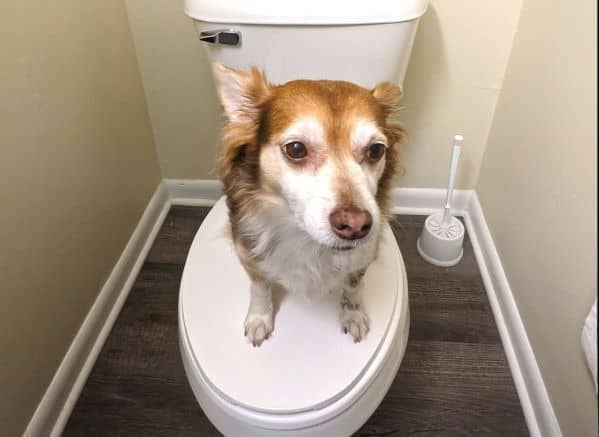
Take note of what and how it is coming out of your pet. Do they appear to be straining when they are going to the bathroom? Check to see if there is any blood or mucus in their feces or urine.
Weight Loss/Gain
This is where it is important to take your pet’s weight on a regular schedule. Sudden weight loss or gain can be an important clue as to what may be ailing your animal. This information combined with any change in appetite or energy level can help with a proper diagnosis. Even if there are no other symptoms, a sudden change in weight could be the first clue that something is wrong.

If you are concerned about your pet’s weight, we have a post that goes over two ways to tell if they are at a healthy weight AND tips on how to get or keep them there.
Energy Level and Behavior
Take careful note of any change in behavior that your animal has started. Record if they have suddenly started pacing or licking more as this can be a sign of anxiety or pain. You will also want to watch to see if their activity level has changed or if they have started doing any kind of repetitive behaviors. Even the smallest behavioral change can be an important clue to figuring out what is wrong with your pet.
What You Have Tried
In certain instances, you may choose not to rush to make an appointment with your vet right away. Some issues may resolve on their own, or with just a little extra help from you. You can also call your vet to ask for advice. If you decide that your dog still needs to go to the clinic, let your veterinarian know what steps you have already taken at home.
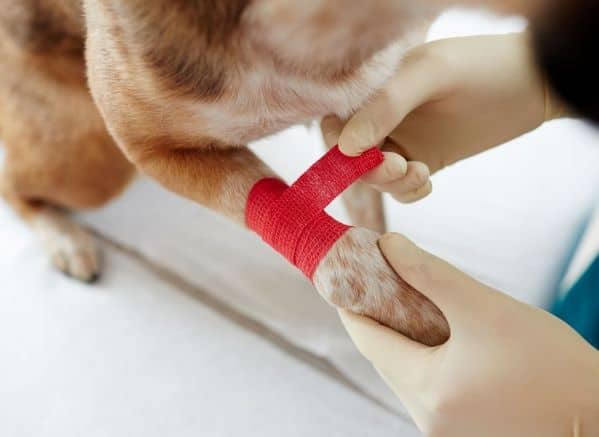
It is important for them to know what medications or treatments you may have tried and how your pet responded to them. Treatments could include rest if they seemed to have injured a limb or using beneficial food like pumpkin or cranberry for digestive issues. It could also include eliminating new factors in the environment like stopping the use of a newly introduced essential oil. All these clues can help your vet decide their next steps.
You Got This!
When your vet is fully armed with as much information as you can give them, they are more likely to be able to quickly and accurately diagnose your pet. By paying close attention and recording what has been going on with your pet, you can give your vet the most accurate and complete information. If you are not sure about something, don’t worry about it. In the vet’s office, honesty is the best policy. Your pet and their doctor will appreciate the truth about what has happened. If you don’t feel comfortable having open conversations with your veterinarian, then it may be time to find a new one. This is one of the most important relationships you have with regard to keeping your pet happy and healthy.
Don’t forget to subscribe to get your Vet Visit Quick Report Form!
Pin For Later:
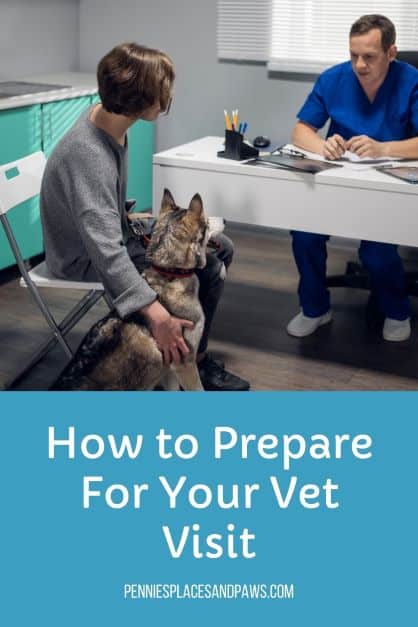
Amazon and the Amazon logo are trademarks of Amazon.com, Inc, or its affiliates.







Such good info! I never really thought about preparing for a Vet visit. Makes sense and seems very helpful tho.
Thank you- It especially helps when your pet is ‘mysteriously’ ill!
You have so many great tips, but my favorite is knowing our pets’ medications. So often, I arrive at the vet, and I’m asked about medicines, and I don’t know the answer because I didn’t think to write it down before coming to the vet.
We have a shelf full of meds for our pups (and ourselves). At this point, I try to have it all written down so I don’t forget who’s on what. LOL
These are great tips to get prepared for a vet visit. It’s so true that sometimes our thoughts can mislead a diagnosis.
Yes, I’ve seen it a lot in the zoo field where keepers assume one thing and it ends up being another. Happens to the best of us!
this is such a good piece. We just lost our golden to cancer, I thought she just had a belly ache and my husband took her in and he called and said a tumor had exploded and she wasn’t coming home! It devastated us. Thank you for writing all this good information.
I am so sorry for your loss. Losing a pet is unbelievably difficult.
This is so good. Lots of great information that you don’t even think about. It’s always stressful when a fur baby gets sick.
Thank you! It’s hard when they can’t tell us what’s wrong with them. It’s like solving a mystery!
These are great tips. I always dread having to go to the vet, but these tips should make it easier for the next time! 🙂
Vet visits can be overwhelming. I hope this helps!!
Wow, this is a lot of great information. I feel so much better prepared!
I hope it helps if your pup ever starts not feeling well!
All of the veterinarians out there will thank you for this detailed post!
LOL, All the things I’ve learned as a zookeeper working closely with vet staff. The vets for our dogs appreciate the help! They deserve as much help as we can give!
These are excellent tips! It’s good to bring information to the vet to help with proper care.
Thanks! Vets have a tough job and the more we can help, the better for everyone!
Get tips for pet owners! Especially if they are newer pet owners!
Thank you!
These are great reminders for a vet visit. I do all of this when I take my kids to the doctor but I’m not usually that organized with the vet!
I have to be better about doing this for myself when I go to the doctor! LOL
This is great information for human doctor appointments as well as vet appointments!
Very true!
Navigating pet health can be complicated. This is a great list of how to handle it.
It can be so hard. Thank you for the compliment!
This is a great post for pet owners! Just like you would be prepared when you visit your General Practitioner, you should also have as many details when you visit your vet.
Very true!